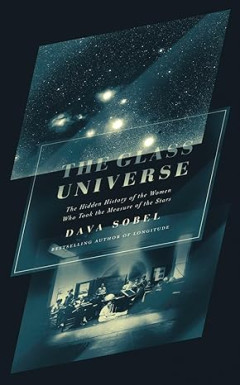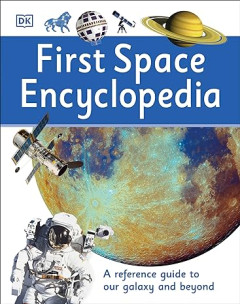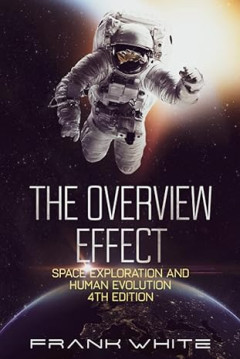Ditapis dengan
E-book A Researcher’s Guide to: Fruit Fly Research
For decades, researchers have used the fruit fly Drosophila to probe the combined effects of microgravity and other conditions of spaceflight with exposure to ionizing radiation. Drosophila melanogaster provides a well-characterized model organism that is both genetically complex and relatively modest in its habitat and life support requirements. Microgravity exposure, a unique biological chall…
- Edisi
- -
- ISBN/ISSN
- -
- Deskripsi Fisik
- 48 halaman, ilus.
- Judul Seri
- -
- No. Panggil
- 520 NAS a

E-book The Glass Universe: The Hidden History of the Women Who Took the Measu…
- Edisi
- -
- ISBN/ISSN
- 9780007548194
- Deskripsi Fisik
- 400 halaman
- Judul Seri
- -
- No. Panggil
- 520 SOB t
- Edisi
- -
- ISBN/ISSN
- 9780007548194
- Deskripsi Fisik
- 400 halaman
- Judul Seri
- -
- No. Panggil
- 520 SOB t

E-book First Space Encyclopedia
Reach for the stars in the updated First Space Encyclopedia! Explore the planets and discover amazing facts about nearby galaxies. A delightful first reference book about space for young astronomers, First Space Encyclopedia takes readers on a journey through the universe, from the beginning of space itself to current space technology. Find out what it takes to be an astronaut, what it is…
- Edisi
- -
- ISBN/ISSN
- 978024118743
- Deskripsi Fisik
- 138 halaman, ilus.
- Judul Seri
- -
- No. Panggil
- 523.112 NAN f

E-book The Overview Effect: Space Exploration and Human Evolution, 4rd Edition
More than three decades ago, Frank White coined the term “Overview Effect” to describe the cognitive shift that results from the experience of viewing the Earth from space and in space, from orbit or on a lunar mission. He found that with great consistency, this experience profoundly affects space travelers’ worldviews—their perceptions of themselves, our planet, and our understanding o…
- Edisi
- -
- ISBN/ISSN
- 9798735748458
- Deskripsi Fisik
- 618 halaman
- Judul Seri
- -
- No. Panggil
- 520 WHI t
E-book CAP Journal Issues 34 Special Edition II Celebrating 100 Years of the …
- Edisi
- -
- ISBN/ISSN
- -
- Deskripsi Fisik
- 44 halaman, ilus.
- Judul Seri
- -
- No. Panggil
- 520 IAU c
- Edisi
- -
- ISBN/ISSN
- -
- Deskripsi Fisik
- 44 halaman, ilus.
- Judul Seri
- -
- No. Panggil
- 520 IAU c
E-book Astronomy: A history of Man's Investigation of the Universe
Hoyle begins his story with accomplishments of the astronomers of the ancient world - the Babylonians, Mesopotamians, Egyptians, Greeks, and Romans - amd their attempts to measure distance between heavenly bodies and to find order in the bewilding motions of the planets. Hoyle then recreates the richly varied lives and works of Copernicus, Kepler, Brache, and Galileo, showing hoe their work set…
- Edisi
- -
- ISBN/ISSN
- -
- Deskripsi Fisik
- 328 halaman, ilus.
- Judul Seri
- -
- No. Panggil
- 520 HOY a
E-Book Astronomy Hours
- Edisi
- -
- ISBN/ISSN
- -
- Deskripsi Fisik
- 23 halaman. ilus.
- Judul Seri
- -
- No. Panggil
- 520 AFI a
- Edisi
- -
- ISBN/ISSN
- -
- Deskripsi Fisik
- 23 halaman. ilus.
- Judul Seri
- -
- No. Panggil
- 520 AFI a
E-Book CAP Journal Issues 33: Special Edition Celebrating 100 Years of The Pl…
- Edisi
- -
- ISBN/ISSN
- -
- Deskripsi Fisik
- 64 halaman, ilus.
- Judul Seri
- -
- No. Panggil
- 520 IAU c
- Edisi
- -
- ISBN/ISSN
- -
- Deskripsi Fisik
- 64 halaman, ilus.
- Judul Seri
- -
- No. Panggil
- 520 IAU c
E-Book CAP JOURNAL ISSUE 26: Spotlighting A Black Hole
- Edisi
- -
- ISBN/ISSN
- -
- Deskripsi Fisik
- 37 halaman
- Judul Seri
- -
- No. Panggil
- 520 CAP
- Edisi
- -
- ISBN/ISSN
- -
- Deskripsi Fisik
- 37 halaman
- Judul Seri
- -
- No. Panggil
- 520 CAP
E-book Fundamental Astronomy
During the rapid development of seafaring, when voyages extended farther and farther from home ports, position determination presented a problem for which astronomy offered a practical solution. Solving these problems of navigation were the most important tasks of astronomy in the 17th and 18th centuries, when the first precise tables on the movements of the planets and on other celestial pheno…
- Edisi
- -
- ISBN/ISSN
- 9783540341437
- Deskripsi Fisik
- 507 hlm
- Judul Seri
- -
- No. Panggil
- 520 KAR f
E-book Introduction to Astronomy and Cosmology
Astronomy is probably the oldest of all the sciences. It differs from virtually all other science disciplines in that it is not possible to carry out experimental tests in the laboratory. Instead, the astronomer can only observe what he sees in the Universe and see if his observations fi t the theories that have been put forward. Astronomers do, however, have one great advantage: in the Univers…
- Edisi
- -
- ISBN/ISSN
- 9780470033340
- Deskripsi Fisik
- 362 hlm
- Judul Seri
- -
- No. Panggil
- 520 MOR i
E-book Handbook of Space Astronomy and Astrophysics
This ebook contains space Astronomy and Astrophysics.
- Edisi
- -
- ISBN/ISSN
- 9780511348723
- Deskripsi Fisik
- 781 hlm
- Judul Seri
- -
- No. Panggil
- 520 ZOM h
 Karya Umum
Karya Umum  Filsafat
Filsafat  Agama
Agama  Ilmu-ilmu Sosial
Ilmu-ilmu Sosial  Bahasa
Bahasa  Ilmu-ilmu Murni
Ilmu-ilmu Murni  Ilmu-ilmu Terapan
Ilmu-ilmu Terapan  Kesenian, Hiburan, dan Olahraga
Kesenian, Hiburan, dan Olahraga  Kesusastraan
Kesusastraan  Geografi dan Sejarah
Geografi dan Sejarah